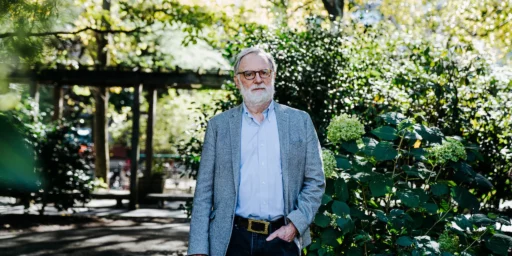The Value of Higher Education
Dean Esmay writes:
As a full-time university student with a bit better than a 3.8 GPA, I often find myself wondering if American society will ever take a step back and ask itself what the basis of its obsession with college degrees really is. Most college degrees, especially undergrad degrees, are worthless. I’m going on three years now and I could take the sum total of what I’ve learned and put it into about two pages of written text, none of it particularly difficult. None of it–at all–required my presence in a classroom, and none of it expanded my mind or my outlook in any significant way.
Arrogant? Hardly. I’ve just given up hope of learning things that I can’t learn much better and more quickly on my own. So I jump through the hoops just fine. I just haven’t learned anything. But I’ll soon have the degree, the piece of paper, anyway. One which I will always view with no small amount of contempt, but which will apparently impress some employers. It’s an aggravation, but it’s what the world apparently wants for some reason.
First, I would note that undergraduate education is aimed at kids coming out of high school, not 37-year-olds. Students at that age obviously bring much less experience to the table and are far more likely to have their minds shaped by the experience. Indeed, Dean quite likely has several professors who are younger than he is.
Secondly, I would agree that most people don’t retain many of the “facts” they learn in college. Don Novello, of Father Guido Sarduci fame, used to joke about this:
Five-Minute University teaches you in five minutes what the average college student remembers five years after he or she’s out of school. . .
Say, if you want to take Spanish, what I teach you is “Co’mo esta usted.” That means “How are you.” And the response is “Muy bien.” That means “Very well.” And believe me, if you took two years of college Spanish, five years after you’re out of school, “Co’mo esta usted” and “Muy bien” is about all you’re gonna remember.
So in my school that’s all you learn . . . Economics? “Supply and demand.” That’s it . . .
While this is an exaggeration, it’s largely true. Most of the specific things I “learned” in calculus, chemistry, and literature are long forgotten. But, theoretically at least, what a college education does is train the mind. My analytical skills are far sharper, my ability to do research and sift credible information from junk is greatly enhanced, and so forth.
Maybe there are some people who could achieve this on their own, reading the best books and devoting themselves to studying the world, as in the movie Good Will Hunting. But these people are exceedingly rare. As someone who spent a few years teaching undergraduates, I can attest that it’s hard enough to get students to do that when they are given hand-selected materials, deadlines, and penalties for not doing it. I suspect I could have gotten 85% or so of my political science undergraduate education on my own, since I was interested in the subject and grasped the field almost intuitively. But I’m not sure how I would have known what was authoritative on my own. Or, without feedback from someone more highly trained, known what I didn’t know.
A tangential issue here is the old “What is a college education for?” question. Certainly, an environment where virtually everyone is expected to attain a degree is problematic. That means more people in our colleges and universities who are either not intellectually equipped for the challenge or who are simply not particularly motivated to learn. To the extent standards are lowered to ensure that most of them graduate with the necessary “paper,” the value of that paper is lowered.






Not that I’m a representative sample, but I went into college right out of high school and was left with a view of college education very similar to Dean’s.
Sure. As an 18-year-old kid, I didn’t appreciate the process much either. But when I got out of school, the difference between myself and the non-college 22-year-olds was rather marked. Granted, some of that has to do with the type of people who go/don’t go to college out of high school. But some of it has to do with higher education itself. I think the learning curve is definitely sped up.
I am perhaps an example of the “Good Will Huntingâ€Â. For financial reasons I was unable to attend a university. Although I did sneak into the odd lecture here and there whilst visiting my indentured friends. Many who are still paying off student loans.
I have spent considerable time improving myself though reading of the material that I find relevant to life. I have become fairly well read so to speak.
I look upon the institutional learning system with disdain.
The only benefit I see of the university system, is the degree makes you more employable with the large corporations, and the pedigree degree from a prestigious university is the requirement to obtain membership in the “good old boy†network.
But, theoretically at least, what a college education does is train the mind. My analytical skills are far sharper, my ability to do research and shift credible information from junk is greatly enhanced, and so forth.
Is this a backhanded slap at Esmay? Because it’s true.
My guess is the person who thinks like this is thinking about a liberal arts, poly sci, or a general “business” degree. I can assure you that the info absorbed during my time earning a BS in Electrical Engineering could not be picked up on the side or through casual reading. The average DEGREED person in a non-engineering discipline cannot talk intelligently about Maxwell’s equations, digital logic or programming theory, much less advanced physics. And for me, while the the details are hazy, the knowledge is there and I have my undergrad degree to thank for it.
I work in high-tech marketing and the best people in this segment are BSEEs with business skills. In 15 years in this field I have seen time and again those without technical degrees try to work in this field and fail, or go into marcomm where it isn’t as important to understand technical detail (try to get a poly sci major to understand electron valences, semiconductor manufacturing technology, analog circuit design, etc. – it’s not possible. You need fundamental physics to get a lot of this stuff, and you are not going to pick that up on the job).
As for my MBA, I consider that a “time accelerator”. The MBA teaches you at a young age what would take you a decade and a half or more to learn on your own working in industry. This is why I would recommend an MBA to anyone under 30, look hard at the reasons why someone is considering it if they are between 30-40, and tell anyone over 40 who has been working in business for 20 years that they should be able to teach most of the courses, so just skip it.
DM,
Agreed all around. Engineering and other vo-tech programs actually teach job skills; the traditional liberal arts fields have never aimed at that. And, yes, advanced degrees–and to some degree higher ed period–are time accelerators.
Similar to what Director Mitch wrote, if you are studying objective facts and underlying theory that have some utility and basis in reality, you will probably retain them. Unfortunately, many aspects of a contemporary liberal arts education have little to do with facts or underlying theory. Sure there’s plenty of theory, but it is mostly detached from reality. Ergo, when you bump into the “real” world, guess what happens to your cherished esoteric postmodern “knowledge?”
Anyway, the most important thing you are supposed to learn in college is how to think and how to learn at an advanced level and pace. It is the “how” much more than the “what” that matters, since in technological fields of study the “what” changes every few years and you’ll only be able to keep up if you have mastered the “how.”
Fundamentally, I’m not sure I like the premise of the question though. Heaven help us if anyone is able to force one pedagogical method down everyone’s throats.